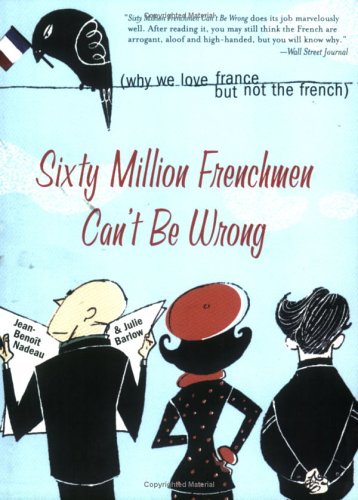This biographical account narrates the often comical adventures and cultural misunderstandings that the British author experienced while living in Southern France. Delightfully written, the book does more than illustrate French culture in an entertaining manner, it also goes to show that the British sense of humor rules!
Two insightful Canadian journalists share their analysis of French society in 23 chapters that provide an exhaustive overview of French society, including the ways in which French people think of their language; human interactions the French way; the role of their state in daily life; education; and many other things that make France different from most other similar industrialized countries.
France and America are alike in many ways. However, many fundamental differences lie in subtle details that can be very difficult to pinpoint or identify. The author of this book does just that, providing valuable and enlightening explanations of how French and American cultures differ in fundamental areas like friendship; romance; or privacy, among other interesting topics.
Follow Julia Child’s mouthwatering gastronomical adventures in France, from her arrival in the country as a young woman with no knowledge of cooking to her impressive mastery of the most codified and theorized cuisine in the world. This bestselling memoir is a beautiful story of cultural discovery; personal drive; and creativity. Julia Child’s passion for French cuisine contagiously springs from every page.
Before he took his post as US ambassador to France, Thomas Jefferson struck an unusual deal with his slave James Heming. In exchange for moving with him to the City of Lights, being trained by the best French chefs, and in turns training another slave upon their return to the US, Heming would gain his freedom. This book not only tells this fascinating story, but also describes Jefferson’s passion for French gastronomy, good food and wine; his relations with the political stars of the period, like Samuel Adams, La Fayette, or king Louis XVI; and aristocratic life in Eighteenth-century Paris.
The American version of "A Year in Provence". This biographical account narrates the often comical adventures and cultural misunderstandings that the American author experienced while adapting to life in Paris. A light and entertaining book with snarky humor intended for Americans who are already familiar with French culture.
The Colors of Catalonia tells you about all the extraordinary 20th century artists assosiated with Catalonia. We strongly recommend reading it if you are interested in our Best Kept Secrets of the French-Spanish Borderland sojourn.
The author, Patrick O'Brian, lived in the base town of our French-Spanish Borderland sojourn. Best known for his naval novels, this is a biography of his friend Picasso who grew up in Spanish Catalonia and returned regularly to stay in many of the places you will visit on our Best Kept Secrets sojourn of the French-Spanish Borderland.
This is essential reading for our French-Swiss Borderland sojourners. Find out how Catalonia became a nation with the French-Swiss border running right through it. Learn about the famous artists associated with the land. And learn more about the unique Catalan cuisine.
The author does a great job of explaining in plain words the debt that current French culture owes to the reign of seventeenth-century monarch Louis XIV, known as the Sun-King. The legacy of this king doesn’t stop with Versailles, the biggest and most beautiful palace in the world. This book shows how France’s standing as a world cultural beacon in such areas as cuisine, fashion, perfumes, or luxury goods finds its origins in the Sun-King’s ambition to turn France into the cultural capital of the world.
This captivating narratives follows the evolution of the French language from the Roman period through the 21th-century. While it is no surprise that Latin is root of French, the authors tell the entertaining histories of how other languages have shaped French through the ages, such as Old Norse (the Viking dialect) or crusades-era Arabic. We also learn about the love affairs and multiple exchanges that have linked French and English ever since the 11th-century. The book also deals with the spread of French as a global language; how countries around the world are taking possession of it; and how resilient it remains in the face of the domination of English as the first international lingua franca.
The authors offer a perceptive understanding of French culture and attitudes. They address a wide range of topics and issues, like friendship, family, politics, work, religion or romance, among others. The book also provides valuable advice to expats or business people who want to succeed in France.











